Can I visit my boyfriend? My parents? Can I go fishing or bushwalking? Coronavirus rules in NSW, Queensland and Victoria explained
- Written by Sunanda Creagh, Head of Digital Storytelling
Editor’s note: this article covers three states but we will endeavour to update it with information from the other states and territories as we are able to collect it.
As new, stricter measures intended to limit the spread of coronavirus were announced, many turned to Google to work out what they meant in practice.
According to Google Trends, some of the top coronavirus searches nationally in the last day or so include “can I visit my parents coronavirus Australia?”, “can I go fishing during coronavirus?” and “can I go for a drive during coronavirus Australia?”
“Can I visit my boyfriend during coronavirus Australia?” was also a common one.
We asked three legal experts – Jarryd Bartle in Victoria, Thalia Anthony in NSW and Susan Harris Rimmer in Queensland – to help shed some light on what the new rules might mean for residents of those states.
Read more: What can you use a telehealth consult for and when should you physically visit your GP?
Can I visit my parents?
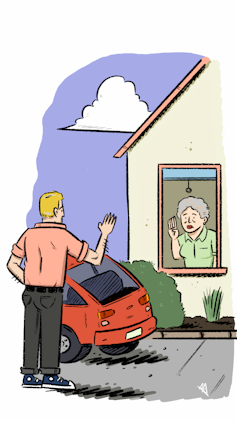 Wes Mountain/The Conversation, CC BY-ND
Jarryd Bartle, Victoria:
My answers are based on the Stay at Home Directions, made by the Deputy Chief Health Officer on March 30 2020.
In Victoria, you can only visit someone outside your own household for care or compassionate reasons or for a valid activity (such as work or education). In terms of parents, they need to be someone who has “particular needs”.
This includes people who are in need because of age, infirmity, disability, illness or any other chronic health condition. It includes mental health issues and pregnancy.
This includes visits to a residential aged care facility, except in cases where they are not allowing visitors.
But generally, you should be remaining in your own home.
Failure to comply could result in an on-the-spot fine of up to $1,652 or a more serious fine of $19,800 through courts.
Thalia Anthony, NSW:
My answers are based on the Public Health (COVID-19 Restrictions on Gathering and Movement) Order 2020 (NSW), effective March 31 2020 (especially the “Reasonable Excuses” section under Schedule 1). This Order is enforced by the Public Health Act 2010 (NSW) section 10.
Failure to comply attracts a maximum penalty of imprisonment for six months or a fine of up to $11,000 (or both) plus a further $5,500 fine each day the offence continues.
The answers to these questions are relevant at April 1 2020 and may change in a matter of days. The rapid pace of change is evident by the fact that since March 16 the NSW government has issued seven orders.
Overall, in New South Wales you must stay at your own home unless you are homeless or have a reasonable excuse. Reasonable excuses include obtaining food, goods or services, travelling to necessary work or education, exercise, medical or caring reasons.
On the question of visiting parents: if your parents require care for physical or mental health reasons, then you can visit them. This includes personal care, such as delivering food or medical supplies, assisting with medication, helping them to maintain a safe home and to maintain hygiene as well as facilitating any emergency assistance.
The NSW Police Commissioner has indicated care is a broad concept that includes for the purposes of being a caring person. This might suggest police will not be policing homes to enforce this order narrowly.
Nonetheless, you may want to consider whether unnecessary visits are unnecessarily exposing your higher-risk parents to COVID-19 if you are an asymptomatic carrier.
Susan Harris Rimmer, Queensland:
On January 29 2020, under Section 362B of the Public Health Act 2005, the minister for health and minister for ambulance services made an order declaring a public health emergency for “all of Queensland” in relation to COVID-19. It lasts to May 19, 2020, and it may be further extended.
This direction prohibits citizens “from leaving their residence except for permitted purposes”. Queensland restricts gatherings of more than two people. This applies both in public and private area but exempts members of the same household.
All people must stay in their homes except for:
shopping for essentials - food and necessary supplies;
medical or health care needs, including compassionate requirements;
exercise with no more than one other person (unless from your household);
providing care or assistance to an immediate family member;
work and study (including childcare) if you can’t work or learn remotely.
attending any court of Australia or to comply with or give effect to orders of the court.
Queensland police officers will be able to issue on-the-spot fines of $1,334.50 for individuals and $6,672.50 for corporations, who breach these laws. The maximum penalties available through the courts will be 10 times those amounts.
The premier summarises in a neat tweet here.
What if home is not safe? It is not clear yet what should happen in a national or state lockdown. The National Sexual Assault, Family and Domestic Violence Counselling Line – 1800 RESPECT (1800 737 732) – is available 24 hours a day, seven days a week for any Australian who has experienced, or is at risk of, family and domestic violence and/or sexual assault.
Where should people go? Academic Amanda Gearing argues a possible solution is for people who own a second home that is standing empty to make them available via police for emergency safe houses, with subsidised rental. Or we could use empty hotels, currently being used for quarantine.
So, can you visit your parents? You must have a permitted purpose. Remember, if your parents are elderly, they are more likely to be affected by COVID-19, so be mindful you might do them more harm than good by seeing them. Keep your distance.
If your parent lives alone, you can visit them on your own and you can exercise together, practising social distancing. You can visit a terminally ill relative or attend a funeral.
You can provide assistance, care or support to an immediate member of your family.
However, if they live interstate, are quarantined or in a retirement village that has gone into voluntary and pre-emptive lockdown, you will not be allowed to see them.
Queensland’s rules say a person can be accompanied by members of their household – defining “household” as “persons who ordinarily live at the same residence” but, unlike other states, also extending it to people if they have “family or kinship customs or cultural obligations have the effect of a person living across multiple residences”.
You cannot visit for a social interaction.
You can join the new Queensland Care Army and help seniors without endangering their health.
Read more:
If coronavirus cases don't grow any faster, our health system will probably cope
Can I go fishing or bushwalking?
Wes Mountain/The Conversation, CC BY-ND
Jarryd Bartle, Victoria:
My answers are based on the Stay at Home Directions, made by the Deputy Chief Health Officer on March 30 2020.
In Victoria, you can only visit someone outside your own household for care or compassionate reasons or for a valid activity (such as work or education). In terms of parents, they need to be someone who has “particular needs”.
This includes people who are in need because of age, infirmity, disability, illness or any other chronic health condition. It includes mental health issues and pregnancy.
This includes visits to a residential aged care facility, except in cases where they are not allowing visitors.
But generally, you should be remaining in your own home.
Failure to comply could result in an on-the-spot fine of up to $1,652 or a more serious fine of $19,800 through courts.
Thalia Anthony, NSW:
My answers are based on the Public Health (COVID-19 Restrictions on Gathering and Movement) Order 2020 (NSW), effective March 31 2020 (especially the “Reasonable Excuses” section under Schedule 1). This Order is enforced by the Public Health Act 2010 (NSW) section 10.
Failure to comply attracts a maximum penalty of imprisonment for six months or a fine of up to $11,000 (or both) plus a further $5,500 fine each day the offence continues.
The answers to these questions are relevant at April 1 2020 and may change in a matter of days. The rapid pace of change is evident by the fact that since March 16 the NSW government has issued seven orders.
Overall, in New South Wales you must stay at your own home unless you are homeless or have a reasonable excuse. Reasonable excuses include obtaining food, goods or services, travelling to necessary work or education, exercise, medical or caring reasons.
On the question of visiting parents: if your parents require care for physical or mental health reasons, then you can visit them. This includes personal care, such as delivering food or medical supplies, assisting with medication, helping them to maintain a safe home and to maintain hygiene as well as facilitating any emergency assistance.
The NSW Police Commissioner has indicated care is a broad concept that includes for the purposes of being a caring person. This might suggest police will not be policing homes to enforce this order narrowly.
Nonetheless, you may want to consider whether unnecessary visits are unnecessarily exposing your higher-risk parents to COVID-19 if you are an asymptomatic carrier.
Susan Harris Rimmer, Queensland:
On January 29 2020, under Section 362B of the Public Health Act 2005, the minister for health and minister for ambulance services made an order declaring a public health emergency for “all of Queensland” in relation to COVID-19. It lasts to May 19, 2020, and it may be further extended.
This direction prohibits citizens “from leaving their residence except for permitted purposes”. Queensland restricts gatherings of more than two people. This applies both in public and private area but exempts members of the same household.
All people must stay in their homes except for:
shopping for essentials - food and necessary supplies;
medical or health care needs, including compassionate requirements;
exercise with no more than one other person (unless from your household);
providing care or assistance to an immediate family member;
work and study (including childcare) if you can’t work or learn remotely.
attending any court of Australia or to comply with or give effect to orders of the court.
Queensland police officers will be able to issue on-the-spot fines of $1,334.50 for individuals and $6,672.50 for corporations, who breach these laws. The maximum penalties available through the courts will be 10 times those amounts.
The premier summarises in a neat tweet here.
What if home is not safe? It is not clear yet what should happen in a national or state lockdown. The National Sexual Assault, Family and Domestic Violence Counselling Line – 1800 RESPECT (1800 737 732) – is available 24 hours a day, seven days a week for any Australian who has experienced, or is at risk of, family and domestic violence and/or sexual assault.
Where should people go? Academic Amanda Gearing argues a possible solution is for people who own a second home that is standing empty to make them available via police for emergency safe houses, with subsidised rental. Or we could use empty hotels, currently being used for quarantine.
So, can you visit your parents? You must have a permitted purpose. Remember, if your parents are elderly, they are more likely to be affected by COVID-19, so be mindful you might do them more harm than good by seeing them. Keep your distance.
If your parent lives alone, you can visit them on your own and you can exercise together, practising social distancing. You can visit a terminally ill relative or attend a funeral.
You can provide assistance, care or support to an immediate member of your family.
However, if they live interstate, are quarantined or in a retirement village that has gone into voluntary and pre-emptive lockdown, you will not be allowed to see them.
Queensland’s rules say a person can be accompanied by members of their household – defining “household” as “persons who ordinarily live at the same residence” but, unlike other states, also extending it to people if they have “family or kinship customs or cultural obligations have the effect of a person living across multiple residences”.
You cannot visit for a social interaction.
You can join the new Queensland Care Army and help seniors without endangering their health.
Read more:
If coronavirus cases don't grow any faster, our health system will probably cope
Can I go fishing or bushwalking?
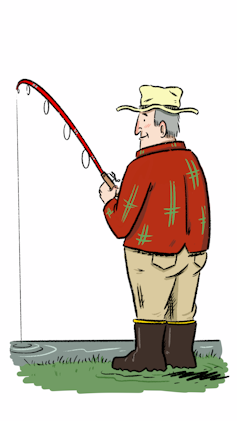 Wes Mountain/The Conversation, CC BY-ND
Jarryd Bartle, Victoria: You are allowed to exercise. Whether or not those activities fall within the definition of exercise as outlined in the direction is unclear.
Police have discretionary power to decide their interpretation of these measures. Daniel Andrews has said he’s not going to hamstring police, so their discretionary powers remain quite broad. It may come down to what the officer who stops you interprets as “exercise”.
My understanding is similar ambiguities exist in NSW.
UPDATE: Late on April 1 the Victorian Minister for Fisheries posted on Facebook clarifying that recreational fishing is not allowed.
Thalia Anthony, NSW: If the fishing or bushwalking is not local and you have to drive to get there, you cannot do this altogether.
If are seeking to do these activities locally, they could constitute a reasonable excuse to leave your home on the grounds of “exercise”, although this is more likely to be the case for bushwalking.
It is conceivable that fishing could be regarded as exercise where it involves strenuous activity, such as crabbing by walking through water, as opposed to sitting down on a jetty or a boat with a line (although even this has some anaerobic benefits and contributes to the classification of fishing as a “sport”).
It is more likely, nonetheless, that exercise could be regarded as an incidental rather than a characteristic feature of fishing and therefore is not allowed.
UPDATE: Late April 1, it was reported that NSW police minister David Elliot received legal advice that “recreational fishing is deemed passive exercise and therefore technically exempt”.
Bushwalking is more likely to be classed as exercise, notwithstanding its meditative and nature-connecting qualities. However, walking on narrow bushwalking tracks where you may encounter other people may preclude physical distancing, making the activity unlawful. Furthermore, most national parks in NSW are now closed and bushwalking would not be permitted in these areas.
Finally, if you go bushwalking, you cannot do it with more than one person unless they are in your household.
Susan Harris Rimmer, Queensland: Being Queensland, this has been addressed in some detail. The Queensland transport minister Mark Bailey says people can still use their boats in Queensland waters to fish or travel for essential reasons, but not for recreational purposes.
“If you own a boat and want to head out in the water in your local community to fish for food this weekend, you can,” Mr Bailey said.
“If you need your boat to travel locally in your community, you can still do that.
"If you want to head out on your kayak or stand up paddle board for exercise, you still can.
But no sunbathing! You can go to the beach for exercise, but cannot work out on gym equipment at beachside public parks as the facilities are listed as "non-essential” premises. Gold Coast mayor Tom Tate clarified yesterday that “you can do your exercise, you can do your push-ups, you can stretch, you can walk quickly.”
Yes, you can go bushwalking for exercise with one other person whilst practising social distancing but stay local. But all camping areas in national parks and state forests are now closed, so no long walks with camping. The Queensland Department of Environment has confirmed that day-use areas, tracks and trails are open at this stage. Social distancing rules apply.
Read more:
Local newspapers are an 'essential service'. They deserve a government rescue package, too
Can I go for a drive?
Wes Mountain/The Conversation, CC BY-ND
Jarryd Bartle, Victoria: You are allowed to exercise. Whether or not those activities fall within the definition of exercise as outlined in the direction is unclear.
Police have discretionary power to decide their interpretation of these measures. Daniel Andrews has said he’s not going to hamstring police, so their discretionary powers remain quite broad. It may come down to what the officer who stops you interprets as “exercise”.
My understanding is similar ambiguities exist in NSW.
UPDATE: Late on April 1 the Victorian Minister for Fisheries posted on Facebook clarifying that recreational fishing is not allowed.
Thalia Anthony, NSW: If the fishing or bushwalking is not local and you have to drive to get there, you cannot do this altogether.
If are seeking to do these activities locally, they could constitute a reasonable excuse to leave your home on the grounds of “exercise”, although this is more likely to be the case for bushwalking.
It is conceivable that fishing could be regarded as exercise where it involves strenuous activity, such as crabbing by walking through water, as opposed to sitting down on a jetty or a boat with a line (although even this has some anaerobic benefits and contributes to the classification of fishing as a “sport”).
It is more likely, nonetheless, that exercise could be regarded as an incidental rather than a characteristic feature of fishing and therefore is not allowed.
UPDATE: Late April 1, it was reported that NSW police minister David Elliot received legal advice that “recreational fishing is deemed passive exercise and therefore technically exempt”.
Bushwalking is more likely to be classed as exercise, notwithstanding its meditative and nature-connecting qualities. However, walking on narrow bushwalking tracks where you may encounter other people may preclude physical distancing, making the activity unlawful. Furthermore, most national parks in NSW are now closed and bushwalking would not be permitted in these areas.
Finally, if you go bushwalking, you cannot do it with more than one person unless they are in your household.
Susan Harris Rimmer, Queensland: Being Queensland, this has been addressed in some detail. The Queensland transport minister Mark Bailey says people can still use their boats in Queensland waters to fish or travel for essential reasons, but not for recreational purposes.
“If you own a boat and want to head out in the water in your local community to fish for food this weekend, you can,” Mr Bailey said.
“If you need your boat to travel locally in your community, you can still do that.
"If you want to head out on your kayak or stand up paddle board for exercise, you still can.
But no sunbathing! You can go to the beach for exercise, but cannot work out on gym equipment at beachside public parks as the facilities are listed as "non-essential” premises. Gold Coast mayor Tom Tate clarified yesterday that “you can do your exercise, you can do your push-ups, you can stretch, you can walk quickly.”
Yes, you can go bushwalking for exercise with one other person whilst practising social distancing but stay local. But all camping areas in national parks and state forests are now closed, so no long walks with camping. The Queensland Department of Environment has confirmed that day-use areas, tracks and trails are open at this stage. Social distancing rules apply.
Read more:
Local newspapers are an 'essential service'. They deserve a government rescue package, too
Can I go for a drive?
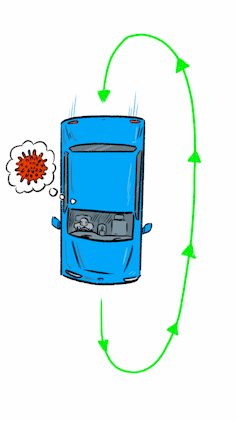 Wes Mountain/The Conversation, CC BY-ND
Jarryd Bartle, Victoria: You can only go for a drive if it’s done for one of the reasons outlined in the direction.
Good reasons to leave home include to get necessary goods and services, for care and other compassionate reasons, for work and education, for exercise, in order to move, as part of shared parenting arrangements or for uniquely exempt gatherings such as weddings or funerals, or in the case of an emergency.
These are nearly identical to the reasonable excuses in NSW.
If you leave “just for a drive” without a good reason, you may be breaking the law.
Thalia Anthony, NSW: You cannot go for a drive unless there is a reasonable excuse to drive, which covers:
Obtaining food, medical supplies, goods and permitted services (not massages, beauty treatment etc) and then presumably at the most local shop to prevent cross-community cluster contamination and inhibiting cluster tracing
Work or education that cannot be done at home
Accessing Centrelink or other social services (including mental health and family violence services)
To fulfil caring responsibilities
To honour shared custody arrangements
To pick up or drop off children at childcare
To attend a wedding or funeral (assuming number limits are observed)
Moving to a new place of residence, between different places of residence or inspecting a potential new place of residence (private visits only)
Donating blood
Undertaking legal obligations (although noting that most court business has been suspended)
To avoid injury or escape harm
Emergencies and compassionate reasons
To provide pastoral care (although only for priests, ministers of religion and members of religious orders).
Susan Harris Rimmer, Queensland: Not for fun. Only leave the house and drive for one of the permitted purposes, stay local. Only two in the car.
Read more:
Meet ‘Sara’, ‘Sharon’ and 'Mel': why people spreading coronavirus anxiety on Twitter might actually be bots
Can I visit my boyfriend or girlfriend?
Wes Mountain/The Conversation, CC BY-ND
Jarryd Bartle, Victoria: You can only go for a drive if it’s done for one of the reasons outlined in the direction.
Good reasons to leave home include to get necessary goods and services, for care and other compassionate reasons, for work and education, for exercise, in order to move, as part of shared parenting arrangements or for uniquely exempt gatherings such as weddings or funerals, or in the case of an emergency.
These are nearly identical to the reasonable excuses in NSW.
If you leave “just for a drive” without a good reason, you may be breaking the law.
Thalia Anthony, NSW: You cannot go for a drive unless there is a reasonable excuse to drive, which covers:
Obtaining food, medical supplies, goods and permitted services (not massages, beauty treatment etc) and then presumably at the most local shop to prevent cross-community cluster contamination and inhibiting cluster tracing
Work or education that cannot be done at home
Accessing Centrelink or other social services (including mental health and family violence services)
To fulfil caring responsibilities
To honour shared custody arrangements
To pick up or drop off children at childcare
To attend a wedding or funeral (assuming number limits are observed)
Moving to a new place of residence, between different places of residence or inspecting a potential new place of residence (private visits only)
Donating blood
Undertaking legal obligations (although noting that most court business has been suspended)
To avoid injury or escape harm
Emergencies and compassionate reasons
To provide pastoral care (although only for priests, ministers of religion and members of religious orders).
Susan Harris Rimmer, Queensland: Not for fun. Only leave the house and drive for one of the permitted purposes, stay local. Only two in the car.
Read more:
Meet ‘Sara’, ‘Sharon’ and 'Mel': why people spreading coronavirus anxiety on Twitter might actually be bots
Can I visit my boyfriend or girlfriend?
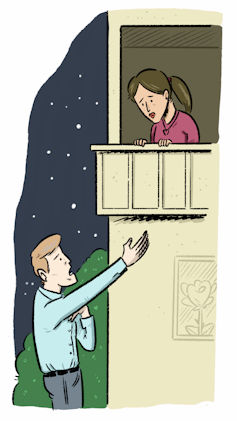 Wes Mountain/The Conversation, CC BY-ND
Jarryd Bartle, Victoria: Although the directions initially stated that you could not visit your partner except for care or compassionate reasons, the Victorian Chief Health Officer has had a change of heart, announcing the rules will be changed to allow partners to stay with or meet each other.
Thalia Anthony, NSW: You cannot visit their home unless they require care (see above in relation to parents). This is consistent with the order that no one can leave their house without a reasonable excuse. But the NSW Police Commissioner has interpreted this to include the general care of a partner.
Further, you may exercise with your partner for whom you do not reside if you respect social distancing (ie no physical affection).
You may also move in with them if their residence is to become your new residence (see point 8 above).
Susan Harris Rimmer, Queensland: If they live across a state border, nope. You cannot see your partner unless it is for one of the permitted purposes such as exercise, if you live near each other, or work or study together.
You can still socialise with the family or roommates you live with, but if there are more than two people in the home, no visitors are allowed.
If someone lives alone they are allowed one social guest. That guest is allowed to leave their home to visit. If someone leaves their house for an essential reason, such as exercise, they can be joined by only one other person or the members of their household.
In Queensland, residents are allowed to leave home to provide care to an “immediate member of the person’s family”. There’s no provision for leaving to care for anyone else. This appears to rule out visiting a partner, unless married/de facto.
Here’s hoping absence makes the heart grow fonder. If you liked it then you shoulda put a ring on it.
Can I go for a walk around my neighbourhood or sit on a park bench?
Wes Mountain/The Conversation, CC BY-ND
Jarryd Bartle, Victoria: Although the directions initially stated that you could not visit your partner except for care or compassionate reasons, the Victorian Chief Health Officer has had a change of heart, announcing the rules will be changed to allow partners to stay with or meet each other.
Thalia Anthony, NSW: You cannot visit their home unless they require care (see above in relation to parents). This is consistent with the order that no one can leave their house without a reasonable excuse. But the NSW Police Commissioner has interpreted this to include the general care of a partner.
Further, you may exercise with your partner for whom you do not reside if you respect social distancing (ie no physical affection).
You may also move in with them if their residence is to become your new residence (see point 8 above).
Susan Harris Rimmer, Queensland: If they live across a state border, nope. You cannot see your partner unless it is for one of the permitted purposes such as exercise, if you live near each other, or work or study together.
You can still socialise with the family or roommates you live with, but if there are more than two people in the home, no visitors are allowed.
If someone lives alone they are allowed one social guest. That guest is allowed to leave their home to visit. If someone leaves their house for an essential reason, such as exercise, they can be joined by only one other person or the members of their household.
In Queensland, residents are allowed to leave home to provide care to an “immediate member of the person’s family”. There’s no provision for leaving to care for anyone else. This appears to rule out visiting a partner, unless married/de facto.
Here’s hoping absence makes the heart grow fonder. If you liked it then you shoulda put a ring on it.
Can I go for a walk around my neighbourhood or sit on a park bench?
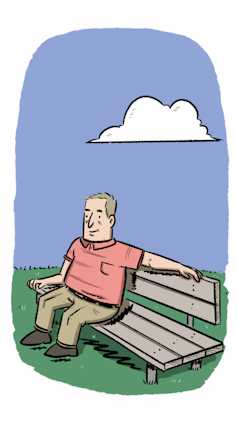 Wes Mountain/The Conversation, CC BY-ND
Jarryd Bartle, Victoria: You can exercise, which would include walking. On a strict reading of the directions, you can’t just sit idly on a park bench. In general, I think the basic rule is to stay at home unless you have a very, very clear thing to do.
You cannot go outside merely for recreation any more.
Thalia Anthony, NSW: You can walk for exercise but not sit on a park bench unless you are doing it to avoid harm.
For, example you can sit on a park bench if you acquire an injury while you are walking and you do not want to aggravate that injury or if you tire from the exercise and need a rest.
Susan Harris Rimmer, Queensland: You can engage in physical exercise so long as you keep social distance of 1.5 metre and only in a group of two. But do not sit on anything, play on anything or touch anything. Playgrounds, BBQ areas and outside gym equipment are now closed throughout Queensland. No sitting down.
And definitely, no sunbathing. But remember, health includes mental health. Stay connected. And good luck.
Read more:
Are you complicit in deaths if you don't stay home? How to do good during the virus lockdown
Wes Mountain/The Conversation, CC BY-ND
Jarryd Bartle, Victoria: You can exercise, which would include walking. On a strict reading of the directions, you can’t just sit idly on a park bench. In general, I think the basic rule is to stay at home unless you have a very, very clear thing to do.
You cannot go outside merely for recreation any more.
Thalia Anthony, NSW: You can walk for exercise but not sit on a park bench unless you are doing it to avoid harm.
For, example you can sit on a park bench if you acquire an injury while you are walking and you do not want to aggravate that injury or if you tire from the exercise and need a rest.
Susan Harris Rimmer, Queensland: You can engage in physical exercise so long as you keep social distance of 1.5 metre and only in a group of two. But do not sit on anything, play on anything or touch anything. Playgrounds, BBQ areas and outside gym equipment are now closed throughout Queensland. No sitting down.
And definitely, no sunbathing. But remember, health includes mental health. Stay connected. And good luck.
Read more:
Are you complicit in deaths if you don't stay home? How to do good during the virus lockdown
Authors: Sunanda Creagh, Head of Digital Storytelling





